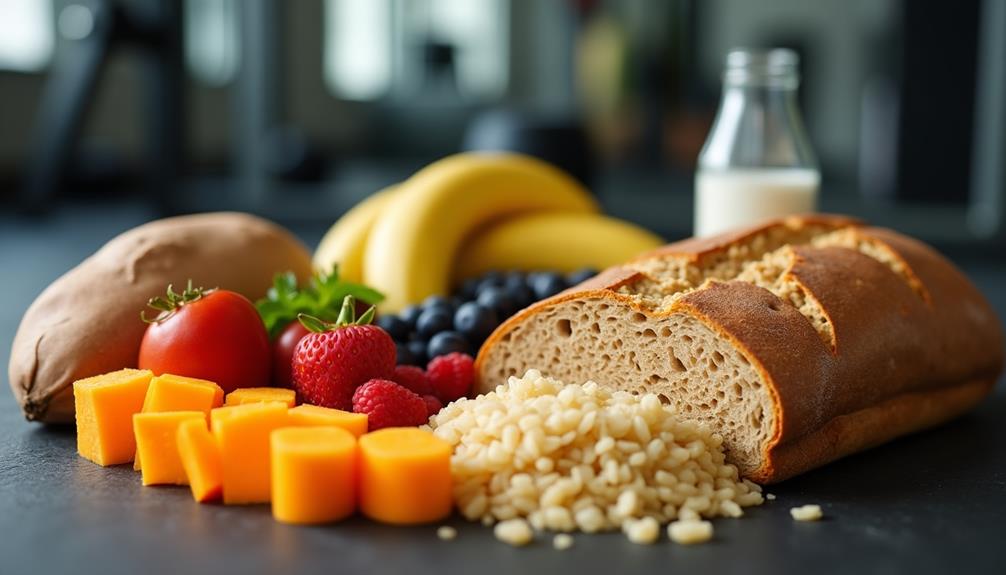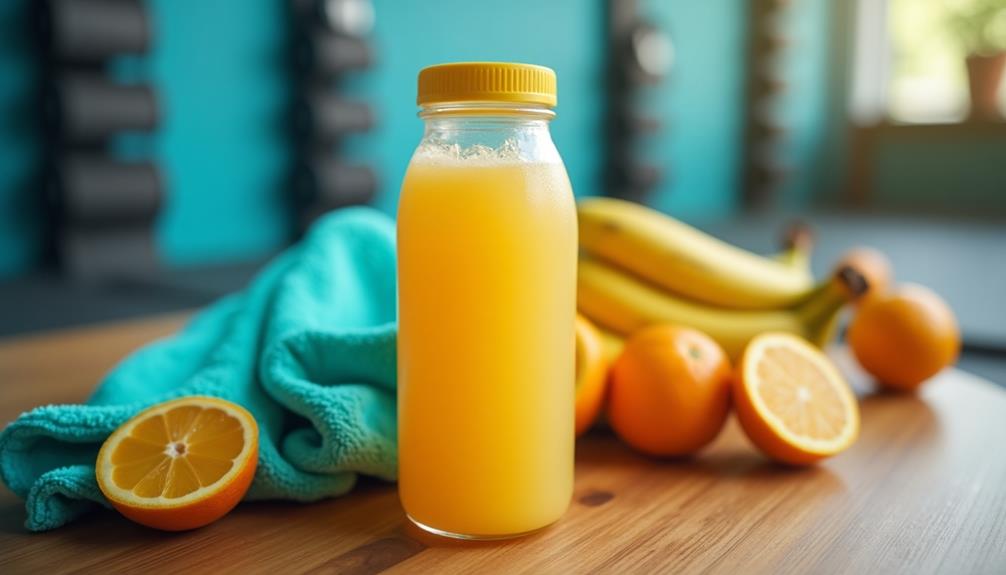To effectively replenish carbohydrates post-workout, start by timing your intake within 30 to 60 minutes after exercise to maximize glycogen absorption. Choose high-glycemic carbs, like bananas or rice cakes, for rapid recovery. Combine your carbs with protein—aim for a 3:1 ratio, such as a banana and Greek yogurt smoothie, to enhance muscle repair. Don't forget hydration; drink water or electrolyte-rich options like coconut water to support recovery. Finally, monitor your recovery by evaluating muscle soreness, energy levels, and hydration status. Understanding these techniques will set the foundation for improved performance in your future workouts.
Core Insights
- Consume high-glycemic index carbs, like bananas or rice cakes, within 30 to 60 minutes post-exercise for optimal glycogen replenishment.
- Pair carbohydrates with protein in a 3:1 ratio, such as a smoothie with banana and Greek yogurt, to enhance recovery.
- Stay hydrated with water and electrolyte-rich beverages like coconut water to support muscle function and recovery processes.
- Monitor your recovery by tracking muscle soreness, energy levels, hydration status, and sleep quality to adjust your intake as needed.
- Choose nutrient-rich carbs like sweet potatoes or oatmeal for sustained energy and overall recovery benefits post-workout.
Timing Your Carbohydrate Intake

Timing your carbohydrate intake after a workout can greatly impact your recovery and performance. To optimize your results, aim to consume carbs within a 30 to 60-minute window post-exercise. During this time, your muscles are primed to absorb nutrients, helping replenish glycogen stores more efficiently. Hydration powders can be an effective way to replenish both electrolytes and carbohydrates quickly after intense workouts.
Start by evaluating your workout intensity. If you've had an intense session, the sooner you refuel, the better. Consider pairing carbohydrates with protein for enhanced recovery. This combination not only restores energy but also helps repair muscle tissue.
Don't forget to hydrate, too. Water plays a crucial role in nutrient absorption and overall recovery. By paying attention to when you eat, you can support your body's recovery process and enhance your future performance.
Choosing the Right Carbohydrates

After you've timed your carbohydrate intake effectively, the next step is choosing the right types of carbohydrates to maximize recovery. Selecting the best carbs can greatly enhance your replenishment process, helping you bounce back quicker. Focus on high-glycemic index carbs for rapid absorption. Fast-acting carbohydrates are essential for ideal post-workout recovery, as they quickly replenish glycogen stores and provide energy. Here are some great options:
- Bananas: Packed with potassium, they're perfect for quick energy.
- Rice cakes: Light and easily digestible, ideal for post-workout.
- Oatmeal: A complex carb that provides sustained energy.
- Sweet potatoes: Nutrient-rich and fiber-filled, great for recovery.
Combining Carbs With Protein

Aim for a ratio of about 3:1 carbs to protein in your post-workout meal or snack. For instance, a smoothie with banana and Greek yogurt is an excellent choice. This mix not only tastes great but also provides the right nutrients. Post-workout vitamins can also be beneficial when combined with carbohydrates and protein, helping to replenish essential nutrients lost during exercise.
Additionally, consuming this combo within 30 minutes post-exercise maximizes benefits. It kickstarts recovery, helping you feel better and perform better in future workouts. So, don't skip this vital step in your post-workout routine.
Hydration and Electrolytes

While replenishing carbohydrates and protein is crucial for recovery, hydration and electrolytes play a significant role too. After your workout, your body loses not just water but essential electrolytes like sodium, potassium, and magnesium. These help maintain fluid balance, support muscle function, and prevent cramps.
To ensure effective recovery, consider the following:
- Drink water to rehydrate and restore fluid levels.
- Include electrolyte-rich beverages or snacks, like coconut water or sports drinks.
- Opt for foods containing natural electrolytes, such as bananas or spinach.
- Monitor your hydration status by checking the color of your urine—it should be light yellow.
Monitoring Your Recovery
Monitoring your recovery is crucial to optimize your performance and prevent injury. To guarantee you're on the right track, keep an eye on key indicators of recovery. Here's a quick reference table to help you assess your status:
| Recovery Indicator | What to Monitor |
|---|---|
| Muscle Soreness | Rate soreness from 1-10 |
| Fatigue Levels | Track daily energy levels |
| Sleep Quality | Note hours and quality of sleep |
| Hydration Status | Check urine color and volume |
Regularly evaluating these factors helps you understand how well your body is bouncing back. Adjust your carbohydrate intake, hydration, and rest based on your observations. This proactive approach supports your fitness goals and enhances overall performance.
Frequently Asked Questions
Can I Skip Carbs if I'm Not Very Hungry Post-Workout?
If you're not very hungry post-workout, you might be tempted to skip carbs. However, your body needs those nutrients to recover efficiently, so it's best to consume something light to aid your recovery.
Are There Any Carbs to Avoid After Intense Workouts?
After intense workouts, avoid carbs like sugary snacks and processed foods—they'll sabotage your recovery faster than a lightning bolt! Instead, focus on whole grains or fruits to fuel your muscles effectively and sustainably.
Can I Use Sports Drinks for Carbohydrate Replenishment?
Yes, you can use sports drinks for carbohydrate replenishment. They're convenient and quickly absorbed, providing the necessary energy. Just choose one with the right balance of sugars and electrolytes to optimize your recovery.
How Do Different Types of Exercise Affect Carbohydrate Needs?
Different types of exercise impact your carbohydrate needs by varying intensity and duration. High-intensity workouts demand more carbs for quick energy, while longer, moderate exercises require sustained replenishment to maintain performance and recovery. Adjust accordingly!
Is It Harmful to Consume Too Many Carbs Post-Workout?
Consuming too many carbs post-workout can lead to excess energy storage. In fact, studies show that over 60% of athletes experience weight gain from excessive carb intake. Balance is key to effective recovery and maintaining your goals.

